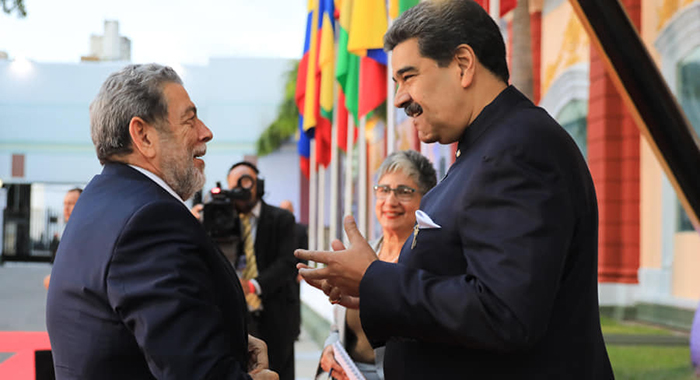Prime Minister Ralph Gonsalves left St. Vincent and the Grenadines (SVG) on Tuesday for his first official visit as the pro tempore President of the Community of Latin America and the Caribbean (CELAC).
The visit comes less than one month after Kingstown’s Jan. 23 unanimous election to head the 33-hemispheric group at a time when members “are at a strategic juncture in global affairs and in hemispheric affairs,” according to Gonsalves.
Gonsalves’ delegation includes SVG’s Coordinator for CELAC Dr. Douglas Slater, a former minister of health and foreign affairs, Information Officer at the state-owned Agency For Public Information, Shevrell “Candy Man” Macmillan and Gregory Lowman of the Prime Minister’s Security Details.
In Venezuela, Gonsalves is scheduled to meet with President Nicolas Maduro as well as the Venezuelan Foreign Minister to discuss bi-lateral issues as well as CELAC matters.
He said on radio on Tuesday that the visit was at Maduro’s instance and discussions will be held to advance a proposal for the development of a Caribbean institute for science, knowledge and technology for CELAC.
“I want to hear his more detailed proposal, at least the framework, a more detailed framework,” Gonsalves said.
“In relation to CELAC, all the administrative arrangements have been put in place, the work plan, within the context of the declaration of Buenos Aires, all those are being elaborated and lots of communication with different countries and areas on matters touching CELAC and those countries.”
Last month, Gonsalves said that Kingstown began its CELAC candidacy bid in 2021 because Kingstown felt that “we were at a strategic, and we are at a strategic, juncture in global affairs and in hemispheric affairs”.
He said his government believes that SVG, within the context of a CARICOM candidacy has “a very special role to play”, noting among the “strategic circumstances” that the world has not seen a downturn like that after the COVID-19 pandemic.
Gonsalves said there has been “tremendous dislocation, tremendous confusion”.
He also mentioned the war in Ukraine and “the supply chain problems which existed hitherto, which have caused a lot of economic and social convulsions apart from the pain and suffering of the people in Ukraine and Russia, themselves”.
The prime minister said this has had a knock-on effect on people in SVG, the hemisphere and the world SVG, “making it difficult for some people to make ends meet.
“So, what we are involved with here is not something which is for show, this is something which touches lives, living and production. And I want our people to understand this.”
Gonsalves said the second issue is that since 2008, there has been “a retreat of the rampaging forces of globalisation and a greater emphasis on regionalisation”.
He said this has both upsides and downsides, adding, “The trade data show it, the investments show it.”
He said this does not mean that the impact has not been uneven across the world adding that he was talking about the global situation.
“Now, if there are all these challenges strategically and globalisation is still at play with neoliberalism but there’s some retreat, and there’s a greater emphasis on regionalisation, it is important for us to be recognising this and be part of the leadership because we possess the experience to help to shape regional institutions, those to which we belong.”
He noted that CARICOM — the Caribbean’s regional integration movement — turns 50 in July.
“We must not miss these things. You see a lot of people, they’re so absorbed, naturally, in living and doing what they’re doing, they don’t think about the large issues like how we who have leadership, we have a responsibility to think about them,” Gonsalves said.
He noted that CELAC represents just over 8% of the world’s population, or 600 million people, including three G20 countries, namely Brazil, Mexico, and Argentina.
Gonsalves pointed out that CELAC bring together leaders who might not otherwise be in the same room.
He noted that when U.S. President, Joe Biden’s personal representative, former Senator Christopher Dodd, addressed CELAC, present in the room were the President of Cuba and the foreign ministers of Venezuela, and Nicaragua, three countries that Washington did not invite to last year’s Summit of the Americas in Los Angeles.
“So, they will come to CELAC and talk, but they don’t want you to go to America and talk,” Gonsalves said, adding that he wants people to see that he speaks “with an independent mind, and try to point out these things” even as some people are “just interested in opportunistic politics”.
He said the two immediate past presidents of Argentina, Mexico and Argentina did good work “in laying the foundation” of CELAC, which was founded in 2011.
“And we will build upon those foundations. But we will also bring our own emphasis,” Gonsalves said.
He noted that the summit passed a declaration containing 111 paragraphs that is the agenda of CELAC for the next year.
“And there are 15 specific resolutions, which constitute part of the agenda of CELAC. Of course, you have to put them in categories to work on them. And we have to prioritise where we are leading.”
Gonsalves said he wants to see if during its tenure SVG can build the institutional base of CELAC.
“… CELAC has a shared experience, but that shared experience must be consolidated in an articulated institutional expression. And is not a supranational organisation, we have to do things by way of inter-governmental agreement,” Gonsalves said.
“But under our watch, I want us to strengthen and to have grow the institutional expression of the shared experiences of CELAC and the articulated outcomes which we have, so that the institutional expression could make those things happen; that we only don’t talk about them, we make them happen, at least those which we consider to be critical.”






